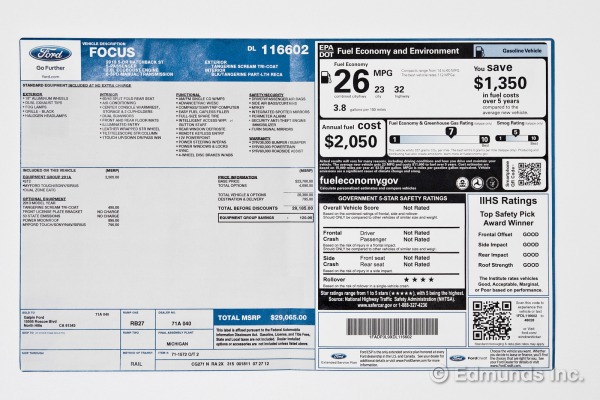
Don't be shocked, but sometimes sticker price is the right price for a new car. Knowing when to pay sticker can remove the stress from car buying and lead to a faster, cleaner buying experience.
Car buyers experience a lot of angst over the eternal question of what to pay for the car. The simple solution is to consult Edmunds' True Market Value (TMV®) price, which reflects what other people are paying for a specific car in their area.
TMV will tell you when dealers are asking (and are likely to get) sticker price. It's usually a matter of supply and demand. If this is the case for a car you really want, you should consider just paying the sticker price and moving on with your life.
But there are those buyers who try to adhere to the "never pay retail" battle cry, even for a hot car that's just come on the market. That's their right, of course, but it might be time-consuming and ultimately lead to frustration. So it helps to understand when a dealer is going to charge sticker price — and mean it.
First, buyers need to know some car pricing terms. "Sticker price" refers to the price displayed on a car's window or "Monroney" sticker. It's also called manufacturer's suggested retail price (MSRP).
Buyers usually treat the sticker price as an "asking price" and try to negotiate a discount. That usually works. But in some cases, it won't. And keep in mind that even within a single dealership there could be pricing differences, depending on whether you contact a salesperson on the floor or the Internet manager (who will often give lower prices).
Here are some common situations that lead a dealer to charge full sticker price and refuse to come down from it:
1. When a car first hits the showroom. Some new cars are highly anticipated and even before the car reaches the dealership, there is a waiting list of eager buyers. Some dealerships even try to get more than sticker price for these cars, asking for a "market adjustment" of $1,000 or more. The over-sticker charge is highly inflated, and it's sometimes possible to negotiate all or part of it away. But a dealer's determination to charge sticker price is a fact of life when demand is high.
2. When you want a hard-to-find combination of color and options. If you've searched the entire state for a Dodge Challenger 392 Hemi Scat Pack Shaker in Sublime Green Pearl and found one at a dealership 300 miles away from you, it will be hard to get a discount. That's because the salesperson knows it is unique and that you really want it. If the salesperson won't budge, where's your leverage? You can't tell the salesperson you'll go to his competition, since there is none. You can always ask for the dealer's "best price," or simply request a discount. But if the answer is no and you still want the car, you'll have to pay sticker.
3. When you're buying in a geographically isolated or wealthy area. In some sections of the country, there are people who seem unwilling to travel outside their immediate area to buy a car and don't take advantage of online car shopping options that often involve delivery to the customer's door. Furthermore, there might be only one dealership for each carmaker, and very low sales volume as well. The local dealers who believe they have a captive market may hold the line on price. Santa Barbara, California, a wealthy and somewhat isolated area, is one example of this. Fort Myers and Naples in Florida are others. In Oregon and Washington, some coastal areas have isolated communities with just one dealership. In such places, you may find prices at or near sticker.
4. When you order the car. This isn't always the case, but many dealers will try to make you pay sticker when you order a car. That's because it is a future sale and many salespeople will have little motivation to negotiate. Still, you can try to find a dealer that will discount the car. Keep in mind, though, that by the time the factory builds and delivers the car, the market (and the price) may have changed. Since you only put down a deposit, you can try to renegotiate the deal. Or, if you back out, the dealership will try to sell the car to another buyer.
5. When it's company policy. This doesn't pertain to new cars or actual MSRP, but in the used-car market, CarMax has a no-haggle price policy. Its "sticker" price is the one you'll pay.
If You're Determined To Tackle the Sticker Price
Maybe you've checked TMV and find that a certain new car is selling for sticker price in your region, but you still feel you can do better. Maybe you think you're an ace negotiator, or you see some angle in the market that you think you can exploit. Here's how to test your hunch and shop around for a better price.
Use dealer price quotes or Price Promise® to shop a broad area and perhaps find a dealer that's ready to discount the car. Remember that car prices vary as market conditions change. Try different ZIP codes in nearby cities to see if there is a price variation. Remember, however, that traveling a significant distance to buy the car or paying to have the car shipped from a distant dealer will reduce your savings. Also, long-distance deals can be tricky. The salesperson knows you've come a long way just for his car and might try to add an extra fee at the last moment.
Whatever your course of action, don't let your pride get the best of you and spend days trying to shave off a few hundred dollars. It's far better to pay a little more for the right car than get a great deal on a car that doesn't meet your needs.